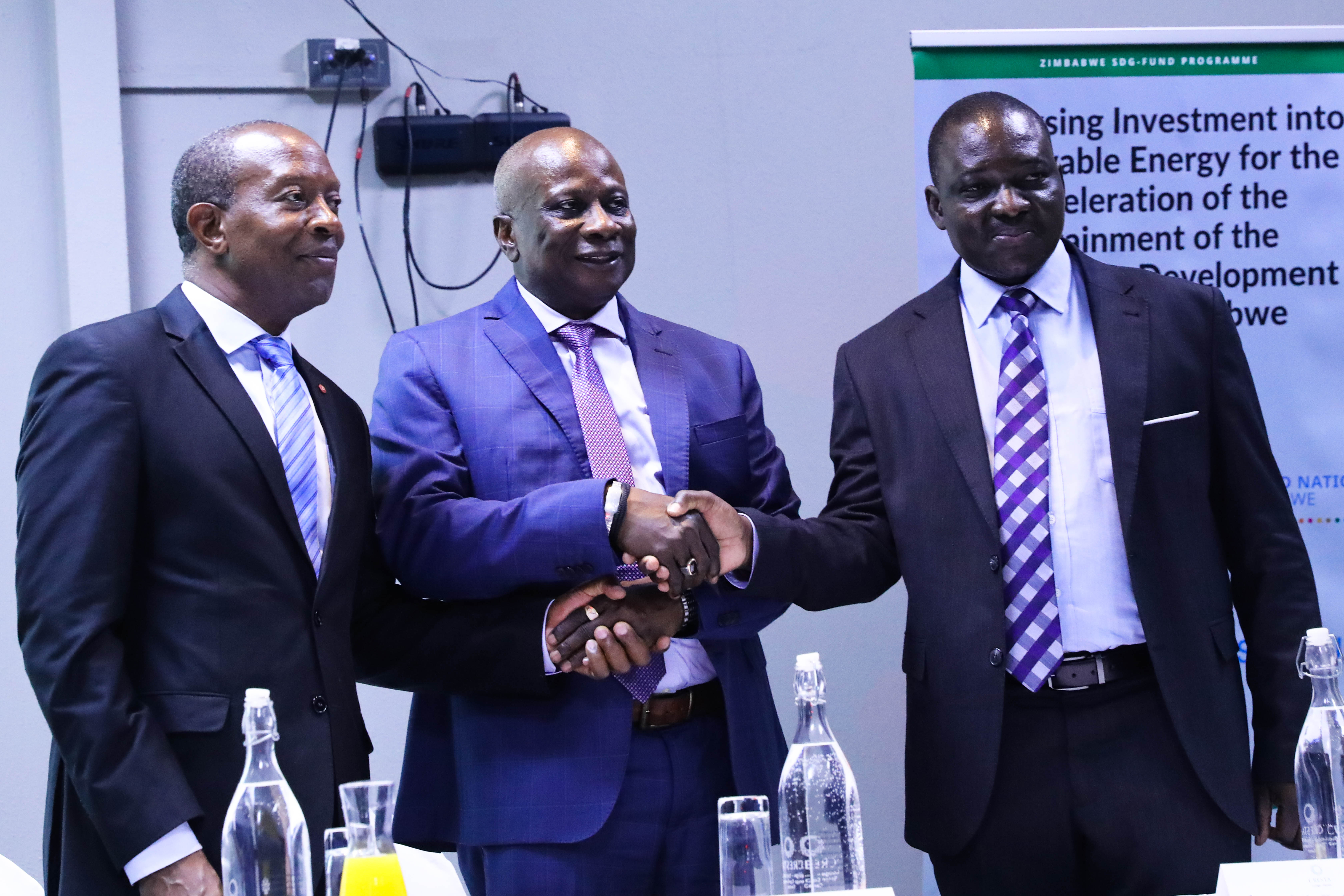Joint SDGs Programme launched to catalyze investment into Renewable Energy
December 19, 2022

Isaac Mashinya - Old Mutual Chief Operations Officer (left) , Edward Kallon - UN Zimbabwe Resident and Humanitarian Coordinator (Middle) and Hon. Zhemu Soda - Minister of Energy and Power Development (Right)
The United Nations (UN) through UN agencies (UNESCO, UNDP, UNCDF, and UNWomen) together with the Government of Zimbabwe launched the Joint SDGs Programme in Harare. Joint SDGs is a 4-year programme meant to accelerate investments in climate change mitigation and renewable energy projects for the achievement of SDGs in Zimbabwe and to maximize the development of local sustainable initiatives.
In addition, the programme will also contribute towards the attainment of national priorities of the Government of Zimbabwe as outlined in the National Development Strategy (NDSI) and the Zimbabwean Framework of the United Nations Sustainable Cooperation 2022-2026, by working towards national goals on economic development, energy access, climate action, women and youth empowerment, and capacity development in renewable energy for productive uses.
Speaking during the launch, Minister of Energy and Power Development, Honorable Z.Soda commented on the involvement of key development partners as the key to attracting low-cost funding for renewable energy. He said, “This initiative by the UN Country Team in partnership with the Government is very critical in developing renewable energy projects that address the poor energy access levels in rural areas.” The project complements the Government’s efforts of creating a dedicated Green Energy Fund which will fast-track the deployment of clean energy to address the climate change crisis, he added
Speaking at the same event, United Nations Resident and Humanitarian Coordinator, Mr. Edward Kallon highlighted the importance of how the United Nations SDG Fund called for the UN Country Teams to come together to assist member states to solve the energy crisis among others, saying “The Joint Programme will establish a full-scale demonstration of concept that will have a significant transformational effect through technical assistance, unlocking private sector funding and business models to support and deepen the renewable energy value chain.”
The launch of the Joint SDGs programme came at a better time when Zimbabwe like any other country regionally, is facing an acute energy crisis, affecting the country's productivity. The current energy challenges, coupled with the current climate challenges call for rapid and extensive adoption of Renewable Energy (RE) technologies in the country.
On the same occasion, Ambassador Raphael Tayerera Faranisi, the Permanent Secretary for Environment, Climate, Tourism, and Hospitality Industry emphasized that the Sustainable Development Fund (SDF) is a fulfilment of the long desire to have a practical means of responding to climate change through mitigation and adaptation actions. “Our work on Climate Change in the last decade and search for practical solutions is coming to fruition. Looking back, we launched a range of climate policy measures with an emphasis on renewable energy as well as providing solutions to our national challenges with emissions and the growing energy access gap.”
The programme will be funded to the tune of USD $10 Million from the United Nations Sustainable Development Goals (UNSDG) Fund and $35 Million potential co-financing and leverage from private and public sectors, Old Mutual as Fund Manager is confident in mobilizing additional resources.
Old Mutual Group Chief Operations Office (GCOO) Mr Isiah Mashinya said one of the ways in which the company delivers its Responsible Business mandate is through Responsible Investment. “We believe it is our fiduciary duty to invest our customers’ funds responsibly. In doing so, we have incorporated environmental, social and governance (ESG) guidelines into our investment processes while we continue to generate sustainable long-term returns”. Working together we will succeed in reaching multitudes of people in Zimbabwe and impacting their lives positively in multiple ways, he added.
The Renewable Energy Fund (REF) will fund small and medium-sized companies to deploy projects with both commercial returns and positive impacts in communities in the renewable energy value chain. The UN will be partnering with capacity-building institutions to capacitate the financial literacy and technical skills of potential youth and women to access funds for the implementation of renewable energy-related solutions.

 Locations
Locations